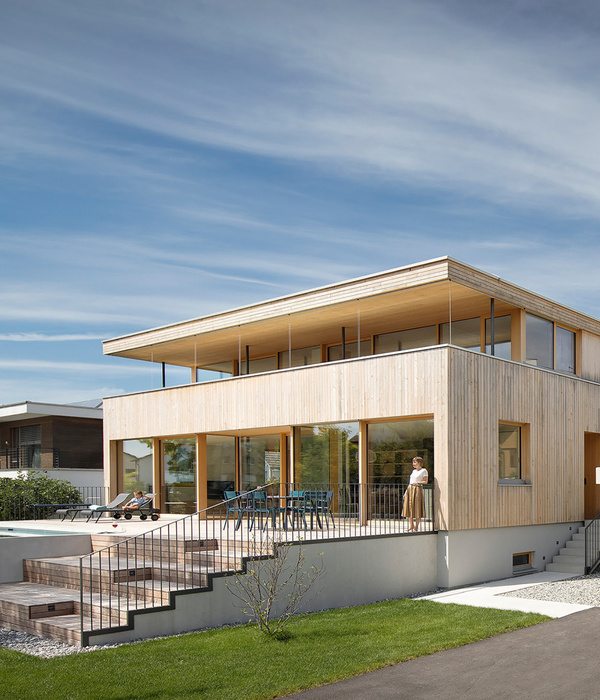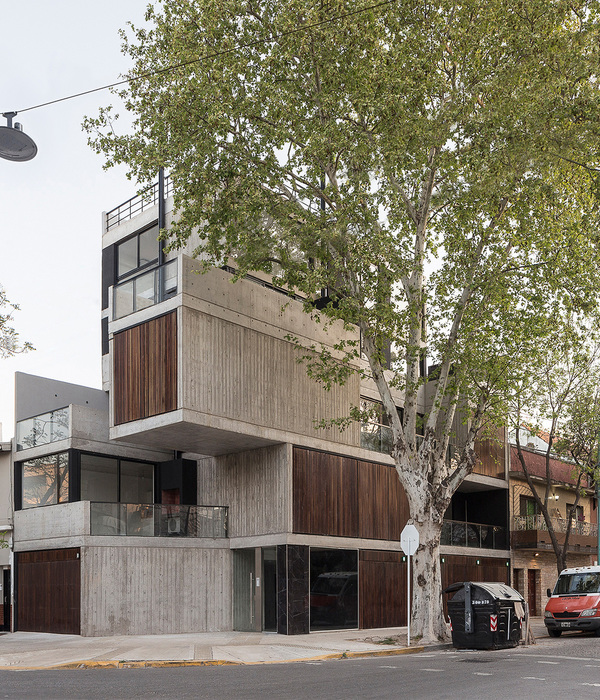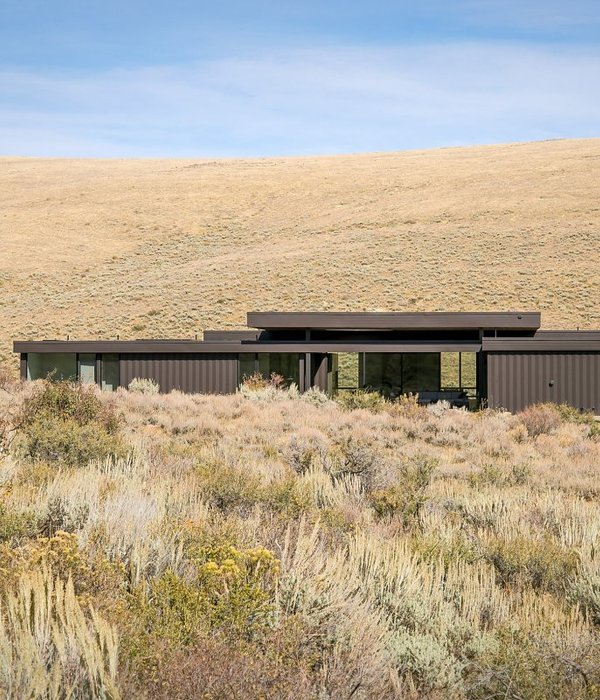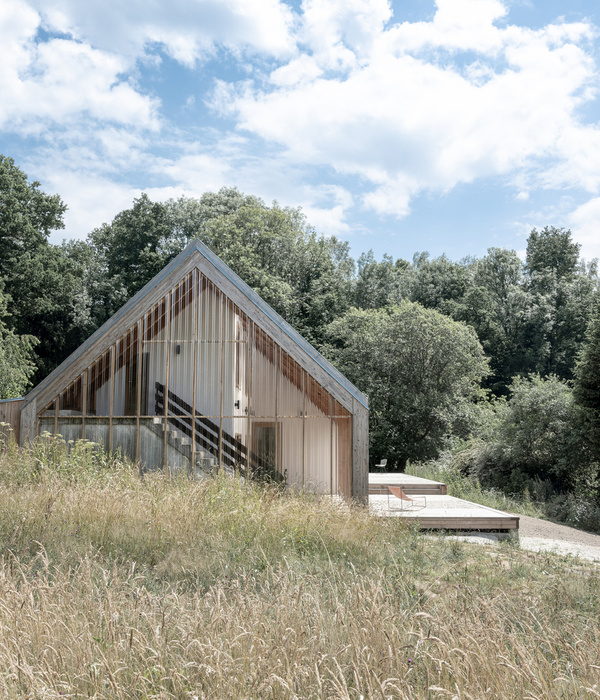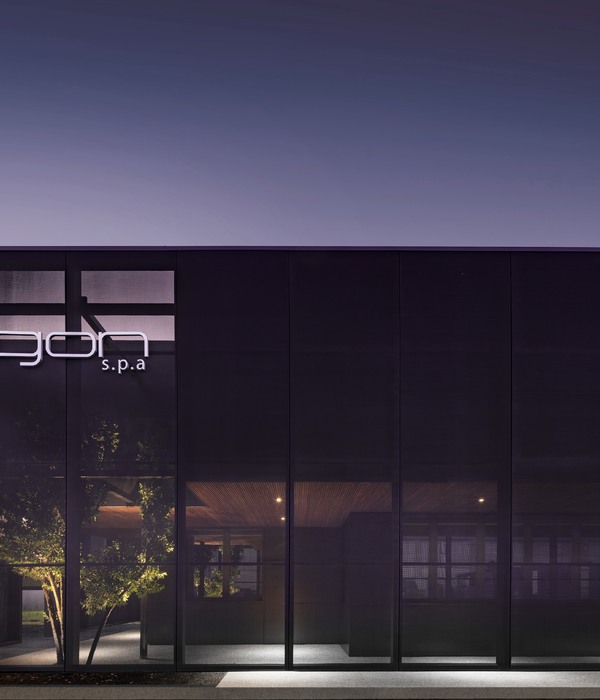在如今喧嚣的生活中,“家”理应成为一个避风的港湾。该住宅是为一对意大利夫妇而设计,在致敬意大利传统的同时汲取了多伦多住宅建筑的结构特征,确保了居住空间在健康、流动性和便利性方面的敏感度。
In the chaos of life today a home needs to be a place of refuge, a solitude for the homeowners to retreat to. Built for an Italian couple, the design pays homage both to the clients’ Italian heritage and that of the Toronto residential building fabric, while ensuring a sensitivity towards wellbeing, mobility, and convenience.
▼住宅外观,exterior view © Doublespace Photography
该项目的设计以业主的价值观和传统为出发点,旨在将过去生活的舒适感再次带往全新的空间。在古罗马建筑中,“拱”元素常以变化的形式出现,强大的光线控制力和自身的轻盈感是其最为独特的属性。
在该项目中,拱形结构在整个地块的长度上延伸,指示出立面与室内空间的关系。从外观上看,砖砌的拱顶是从单一的体量上切割而来,并通过砖块的丰富肌理和与附近房屋比例相呼应的独立采光窗而得到补充和完善。
The design of the Pacific project is born from the homeowners’ values and traditions where the comforts of their past are now viscerally felt within their present-day lives. The vault, in its many permutations, is one of the most common archetypes of ancient Roman architecture, characterized by its powerful modulation of light and its sense of lightness.
The vault geometry extends the length of the lot, informing a relationship between the façade and the interior. From the exterior, the brick vault is a subtraction from the otherwise monolithic brick frontage. This monolithic façade is created through a focus on the rich materiality of the brick coursing, and the isolated dormer which mirrors the proportions of the neighboring house.
▼砖砌的拱顶从单一的体量上切割而来 © Doublespace Photography From the exterior, the brick vault is a subtraction from the otherwise
▼立面,facade © Doublespace Photography
住宅的正面被简化为一个整体的表面,单一且重复的材料装饰融入了荷兰式砌合法的特征,形成一个均匀而又充满质感的砖砌结构,同时将拱形的轮廓突显出来。立面图案营造出一场光影游戏,并捕捉到季节性的变化:在夏季,凸起的砖块投下鲜明的阴影,冬季则变成迎接落雪的架子。
The front of the home is reduced to a monolithic façade – where single repetitive material ornamentation, an adaptation of the Flemish-bond, becomes an even but textured brickfield placing emphasis on the vaulted profile. This field of patterning emphasizes a play of light and shadow and picks up on seasonal changes. In the summer, the protrusions texture the façade with stark shadows, and in the winter the texture transforms through bricks creating shelves for the snow to fall on.
▼均匀而又充满质感的砖砌结构,an even but textured brickfield © Doublespace Photography
▼砖墙肌理,the brick texture © Doublespace Photography
▼拱顶下的入口,entrance under the vault © Doublespace Photography
为了强调简约的几何造型,所有的交通空间、服务空间和入口区域都被集中在一个穿过拱形结构的线性体量当中。在进入房屋后,来访者先从一个紧凑的服务“吧台”进入开阔且通透的起居空间。桶状的拱形空间跨越了整个首层的长度,并通过其几何形状将这些生活空间连接起来,尤其满足了业主对于备餐、用餐和社交活动连贯性的需要。
▼轴测图,axon © Batay-Csorba Architects
To emphasize the project’s geometric simplicity, all circulation, services, and entry conditions are tucked into a linear bar that runs adjacent to the vault. Upon entering the house, visitors begin in a compressed service ‘bar’, which then opens into the ground floor’s expansive and airy living spaces. Throughout the length of the ground floor, the barrel vault’s persistent geometry connects these living spaces, accentuating the client’s desire for connectivity in food preparation, eating, and socializing.
▼入口玄关,entry hall © Doublespace Photography
▼桶状的拱形空间跨越了整个首层的长度 © Doublespace Photography The barrel vault’s persistent geometry connects the living spaces throughout the length of the ground floor
▼餐厨空间,kitchen and dining area © Doublespace Photography
▼从厨房望向客厅,view towards the living room from the kitchen © Doublespace Photography
▼客厅细节,living room interior view © Doublespace Photography
在借助拱形结构连接空间的同时,拱顶上方的开口和缝隙带来适度的停顿与缓解:拱顶在餐厅区域保持了完整,接着在厨房的长度上中断,随后又在客厅重新恢复了完整。这样的设计能够在划定相连空间的同时,使自然光得以照进最狭窄和深邃的区域。
While the barrel vault brings these spaces together, moments of articulation and relief are found through tangential peels and cuts in the vaulted ceiling. The vault remains intact in the dining room, is cut at the length of the kitchen, becomes intact again in the living room, and then unfolds and peels into the backyard. This spatially delineates connected spaces, while also providing natural light to flood into the deep and narrow lot.
▼厨房位于狭长平面的中央,通过上方的天窗收获充裕的自然光线 © Doublespace Photography Situated in the middle of a long floorplan, the kitchen opens and is flooded with natural light from a skylight above
▼拱顶上方的开口和缝隙带来适度的停顿与缓解 © Doublespace Photography Moments of articulation and relief are found through tangential peels and cuts in the vaulted ceiling
相比于首层空间的通透和流畅,二层空间被划分得更加明显,并通过桥梁实现连接。这使得各个房间可以交叠在一个较为紧凑的区域里,并且让阳光可以抵达房间内部和建筑首层。在二层,洗衣房、洗手间和楼梯等服务设施也被塞进了同样的“吧台”之中;而卧室、书房和主人套房则从前向后依次排开,其中卧室和书房之间的切割使得两个房间都能够享受到由天井和立面采光窗带来的自然光。主人套房从后方立面以及厨房顶部的天窗获得照明。
▼轴测分析图,digram © Batay-Csorba Architects
While the ground floor remains unimpeded and connected, the second floor is sliced into rooms connected by bridges. This allows for rooms to be stacked in a narrow lot with natural daylight reaching each room and the ground floor below. On this floor, the services of the laundry room, bathroom, and stairs are also tucked into the ‘bar’, while the bedroom, study, and master suite are stacked from the front to the back of the house. The slice between the bedroom and study allows both rooms to share natural daylight brought in from the lightwell and the façade’s dormer window. The master suite is lit from both the house’s back façade and the skylight above the kitchen.
▼厨房顶部的天窗,the skylight above the kitchen © Doublespace Photography
▼卧室,bedroom © Doublespace Photography
▼室内窗景,view from the room © Doublespace Photography
▼住宅冬景,the house in the winter © Doublespace Photography
▼平面图,floor plans © Batay-Csorba Architects
▼剖面图1,section 1 © Batay-Csorba Architects
▼剖面图2,section 2 © Batay-Csorba Architects
Location: Toronto Ontario, Canada Area: 3,500 sft Photography: Doublespace Photography Status: Completed, 2020
{{item.text_origin}}

